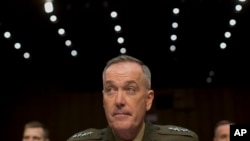CAPITOL HILL —
The commander of U.S.-led forces in Afghanistan says maintaining a residual military presence in the country is desirable and feasible even if Kabul continues to delay signing a bilateral security agreement with the United States.
Testifying before the Senate Armed Services Committee, General Joseph Dunford revealed sharp differences among lawmakers on the wisdom of continued U.S. military investment in the country.
“If we leave at the end of 2014, the Afghan security forces will begin to deteriorate, the security environments will begin to deteriorate, and I think the only debate is the pace of that deterioration,” Dunford said, adding that Afghan militants and terrorists would be strengthened by a complete withdrawal and might once again threaten the United States
Less than a month after President Barack Obama ordered the Pentagon to prepare for total withdrawal of U.S. forces by year’s end, the man tasked with carrying out the order said a complete departure would be costly, essentially surrendering more than a decade of hard-fought coalition gains.
The Obama administration has long maintained that a continued residual force will only be possible if Afghanistan signs a bilateral security agreement, or BSA, with the United States. President Hamid Karzai has refused to do so, but many presidential candidates vying to succeed Karzai later this year say they would sign it.
General Dunford says America can wait.
“If we have a new [Afghan] president by August, I am comfortable that we will be able to maintain [U.S. military] options through that period of time without any difficulty,” he said.
Opinions about what has been gained from America’s longest war vary widely on the committee. Senator Joe Manchin (D-WV) said the effort in Afghanistan “makes no sense to anyone at all” in his home state.
“Are we to tell the American people that we have to maintain a constant presence [in Afghanistan] from now to perpetuity?" he said. "If you cannot do the job in 10, 12 [or] 13 years, you are not going to get the job done.”
Committee chairman Carl Levin (D-Mich.), said Americans are largely unaware of the coalition accomplishments in Afghanistan that would be squandered by a hasty withdrawal.
“During last summer’s fighting season, Afghan forces prevented the Taliban from seizing control of any urban center or district center," he said. "More than 8 million Afghan children are now in school, eight times as many as in 2001; maternal and infant mortality have declined dramatically; the average Afghan has a life expectancy now of 62 years compared to 45 under the Taliban.”
Levin also noted a recent poll showing only a tiny fraction of Afghans favor a return to power by the Taliban.
Testifying before the Senate Armed Services Committee, General Joseph Dunford revealed sharp differences among lawmakers on the wisdom of continued U.S. military investment in the country.
“If we leave at the end of 2014, the Afghan security forces will begin to deteriorate, the security environments will begin to deteriorate, and I think the only debate is the pace of that deterioration,” Dunford said, adding that Afghan militants and terrorists would be strengthened by a complete withdrawal and might once again threaten the United States
Less than a month after President Barack Obama ordered the Pentagon to prepare for total withdrawal of U.S. forces by year’s end, the man tasked with carrying out the order said a complete departure would be costly, essentially surrendering more than a decade of hard-fought coalition gains.
The Obama administration has long maintained that a continued residual force will only be possible if Afghanistan signs a bilateral security agreement, or BSA, with the United States. President Hamid Karzai has refused to do so, but many presidential candidates vying to succeed Karzai later this year say they would sign it.
General Dunford says America can wait.
“If we have a new [Afghan] president by August, I am comfortable that we will be able to maintain [U.S. military] options through that period of time without any difficulty,” he said.
Opinions about what has been gained from America’s longest war vary widely on the committee. Senator Joe Manchin (D-WV) said the effort in Afghanistan “makes no sense to anyone at all” in his home state.
“Are we to tell the American people that we have to maintain a constant presence [in Afghanistan] from now to perpetuity?" he said. "If you cannot do the job in 10, 12 [or] 13 years, you are not going to get the job done.”
Committee chairman Carl Levin (D-Mich.), said Americans are largely unaware of the coalition accomplishments in Afghanistan that would be squandered by a hasty withdrawal.
“During last summer’s fighting season, Afghan forces prevented the Taliban from seizing control of any urban center or district center," he said. "More than 8 million Afghan children are now in school, eight times as many as in 2001; maternal and infant mortality have declined dramatically; the average Afghan has a life expectancy now of 62 years compared to 45 under the Taliban.”
Levin also noted a recent poll showing only a tiny fraction of Afghans favor a return to power by the Taliban.




